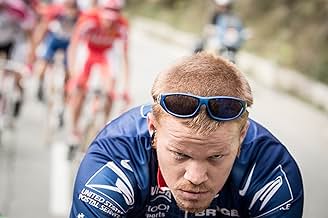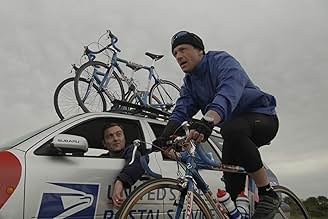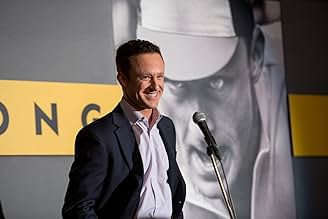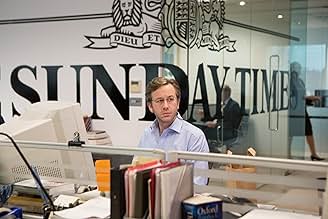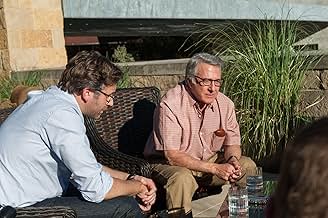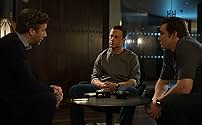CALIFICACIÓN DE IMDb
6.5/10
20 k
TU CALIFICACIÓN
Un periodista deportivo irlandés está convencido de que las victorias de Lance Armstrong del Tour de Francia se deben a sustancias prohibidas. Con esta convicción, comienza a buscar evidenci... Leer todoUn periodista deportivo irlandés está convencido de que las victorias de Lance Armstrong del Tour de Francia se deben a sustancias prohibidas. Con esta convicción, comienza a buscar evidencia que exponga a Armstrong.Un periodista deportivo irlandés está convencido de que las victorias de Lance Armstrong del Tour de Francia se deben a sustancias prohibidas. Con esta convicción, comienza a buscar evidencia que exponga a Armstrong.
- Dirección
- Guionistas
- Todo el elenco y el equipo
- Producción, taquilla y más en IMDbPro
Opiniones destacadas
Quickie Review:
Obsessed with winning the Tour de France, Lance Armstrong (Ben Foster) uses performance enhancing substances to gain the edge. Meanwhile, sports journalist David Walsh (Chris O'Dowd) convinced of the doping conspiracy starts to gather evidence to expose Armstrong. The Program, is an underwhelming retelling of the one of the biggest drug scandals in sports history. Admittedly the actor's performances are good, and the movie overall is shot well. However, the script and the story telling are to the quality of what you might expect from an average TV documentary re-enactment.
Full Review:
Considering the high profile nature of the scandal, I was surprised that The Program wasn't marketed more. I never saw the trailers in the cinemas and when I brought up that I was going to watch this movie in the weekend I was immediately asked by everyone "What's that?" After watching the film it's clear to me that even the studio lacked confidence in the final product.
Few as they may be, there are certainly some redeeming things about The Program. The lead actor Ben Foster gave a solid performance, at a certain point I didn't see him anymore and only saw Lance. Which probably is the biggest compliment I'll give to this movie. I also enjoyed seeing the whole doping operation, it was meticulous and systematic. I really got the sense of the lengths that Lance and his team went to achieve their goals. Although it is definitely disgraceful, I must admit I was rather impressed by how for so long they got away with it all. So I commend the filmmakers for pulling off that aspect of the story. As for the rest of the story, there's more to be desired.
You couldn't ask for better true story material for a sports drama. There was huge potential here, but all of it is lost because of the paint by the numbers approach to the film. Rather than concentrating on a singular character and see them transform over the course of the movie, The Program opts to also give significant spotlight to David Walsh and Floyd Landis (Jesse Plemons). This causes the movie to lose focus with each change. The structure of movie made it blatantly obvious that the director and the editor prioritised showing a checklist of major events in Lance's life rather than telling a coherent story. An example of this false priorities was the introduction of Lance's wife. The whole segment of them meeting lasts for about 45 seconds, we get a quick look at a wedding, and that's it, we never see her again for the rest of the movie. That small segment was just there to show Lance got married at one point. It felt completely unnecessary, instead I would love to have seen how this whole operation affected his relationships and friendships.
The Program, is a movie that no-one knows about and unfortunately will be a forgettable experience for the ones who do watch it. I think if I had caught this as a re-enacted documentary on TV, I'd be really impressed. However when it comes to biographically movies in cinemas it just doesn't hold up to the standard set by recent movies such as The Social Network or Selma for example.
Obsessed with winning the Tour de France, Lance Armstrong (Ben Foster) uses performance enhancing substances to gain the edge. Meanwhile, sports journalist David Walsh (Chris O'Dowd) convinced of the doping conspiracy starts to gather evidence to expose Armstrong. The Program, is an underwhelming retelling of the one of the biggest drug scandals in sports history. Admittedly the actor's performances are good, and the movie overall is shot well. However, the script and the story telling are to the quality of what you might expect from an average TV documentary re-enactment.
Full Review:
Considering the high profile nature of the scandal, I was surprised that The Program wasn't marketed more. I never saw the trailers in the cinemas and when I brought up that I was going to watch this movie in the weekend I was immediately asked by everyone "What's that?" After watching the film it's clear to me that even the studio lacked confidence in the final product.
Few as they may be, there are certainly some redeeming things about The Program. The lead actor Ben Foster gave a solid performance, at a certain point I didn't see him anymore and only saw Lance. Which probably is the biggest compliment I'll give to this movie. I also enjoyed seeing the whole doping operation, it was meticulous and systematic. I really got the sense of the lengths that Lance and his team went to achieve their goals. Although it is definitely disgraceful, I must admit I was rather impressed by how for so long they got away with it all. So I commend the filmmakers for pulling off that aspect of the story. As for the rest of the story, there's more to be desired.
You couldn't ask for better true story material for a sports drama. There was huge potential here, but all of it is lost because of the paint by the numbers approach to the film. Rather than concentrating on a singular character and see them transform over the course of the movie, The Program opts to also give significant spotlight to David Walsh and Floyd Landis (Jesse Plemons). This causes the movie to lose focus with each change. The structure of movie made it blatantly obvious that the director and the editor prioritised showing a checklist of major events in Lance's life rather than telling a coherent story. An example of this false priorities was the introduction of Lance's wife. The whole segment of them meeting lasts for about 45 seconds, we get a quick look at a wedding, and that's it, we never see her again for the rest of the movie. That small segment was just there to show Lance got married at one point. It felt completely unnecessary, instead I would love to have seen how this whole operation affected his relationships and friendships.
The Program, is a movie that no-one knows about and unfortunately will be a forgettable experience for the ones who do watch it. I think if I had caught this as a re-enacted documentary on TV, I'd be really impressed. However when it comes to biographically movies in cinemas it just doesn't hold up to the standard set by recent movies such as The Social Network or Selma for example.
On paper, the life of Lance Armstrong lends itself to a cinematic interpretation quite nicely, but The Program, Stephen Frears' restless, showy Armstrong biopic, feels undercooked and premature. Though Ben Foster's Armstrong jokes about Hollywood's plan for a movie about his life (complete with smirky mispronunciations of Jake Gyllenhaal), his against-the-odds underdog tale was never going to be the more compelling film compared to the true story. It's a small mystery as to why Frears decides to play the first half hour of The Program in such a headspace, urging us to cheer for an idealized version of the famed cyclist despite the inevitable mess that awaits us just around the corner. Such an unnecessary sprawl as we turn through a run-of-the-mill rise-through-the-ranks before the downfall is unkind to detail; instead, it feels like a compromise to make the whole thing go down easier for those unaware of the controversy, and thus the film is probably not quite as invested in the scandals in the first place.
Though The Program is clumsy in its execution and handling of loaded material, it nails its depiction of key moral dilemmas surrounding not just Armstrong's doping scandal that eventually stripped him of his professional accolades–including his seven Tour de France titles– but also effectively ended his athletic career with a worldwide ban from most competitive sports. If Chris O'Dowd's journalist, David Walsh, takes down Lance Armstrong, which he spends the majority of the film trying to do, he's taking down not only massive and respectable cancer charities associated with Armstrong, but also the integrity of the sport itself. The film acknowledges that most cyclists were doping at the time, but it tries to shave down its theme to that point while ignoring juicier social commentary regarding our misguided hero worship culture and how we react to the controversies. There's a lot of meat to chew on that remains untouched on the plate, but perhaps Frears already felt his hands full up with a narrative that's far more focused on the interplay between Armstrong and the man determined to expose his skeletons.
As Armstrong, Foster has the drive, the resemblance, and he can balance light and dark in a way that fits the conflicted tone of the man in reality and the fictionalized version of him. It's a shame, for the most part, that Foster tries too hard for too little payoff, almost desperately searching for Oscar clips, but it's John Hodge's screenplay that ultimately lets him down hard, indulging in trite lines that stick out. In a sense, it fits the Armstrong mantra to be over- rehearsed and only approaching an aura of naturalness, though it doesn't work for Foster. His performance here is similar to Anne Hathaway's in Les Miserables, but he's rarely offered the emotional potency to justify his tone. It's still good work, he's just operating on a different gear to everyone else when he should be leading the pack. While the tone of the film feels like easy resort, at the very least it does a good job of showing the gravity of Armstrong's actions and the gravity of Walsh's accusations.
While Foster may falter, The Program boasts a strong ensemble overall, which also includes Dustin Hoffman, Lee Pace, and Jesse Plemons. O'Dowd made his name in the tongue-in-cheek TV riot The IT Crowd, but he's hard to take seriously in dramas or comedies in both America or Britain. He consistently feels like a novelty more than a talent. Here, he's toe-to-toe with Foster and showing his dramatic potential. While he has one note to play (determined exasperation), he plays it well and pleasantly engages us. Plemons has another underused snitch role to play (to reference his brief turn in Black Mass this year) and brings that same quiet menace that made his Todd on Breaking Bad so magnetic. It's also nice to see Denis Menochet, most memorable in the opening of Inglourious Basterds, to have a meatier role spread across an entire film here as Armstrong's trainer.
Despite its shortcomings, The Program is still largely entertaining, if not enthralling, which it earnestly tries to be. The whiplash editing of its various race sequences would have worked had the film itself been gunning for a darker subtext, but they're left to hang on the screen and thrill in the moment. The film's lowest point, however, is its on-the-nose rota of soundtrack choices. It feels too needy, whereas the rest of the film can get away with what it's doing. Unfortunately, the film's narrative ends far too early. Anyone who has seen Alex Gibney's excellent The Armstrong Lie knows that there's an extra side to the story, and a compelling third act that The Program isn't interested in digging through. In fairness, it's not trying to be "that movie," but what it does dramatize is mostly good enough.
7/10
Read more @ Serving Cinema (http://www.servingcinema.com/)
Though The Program is clumsy in its execution and handling of loaded material, it nails its depiction of key moral dilemmas surrounding not just Armstrong's doping scandal that eventually stripped him of his professional accolades–including his seven Tour de France titles– but also effectively ended his athletic career with a worldwide ban from most competitive sports. If Chris O'Dowd's journalist, David Walsh, takes down Lance Armstrong, which he spends the majority of the film trying to do, he's taking down not only massive and respectable cancer charities associated with Armstrong, but also the integrity of the sport itself. The film acknowledges that most cyclists were doping at the time, but it tries to shave down its theme to that point while ignoring juicier social commentary regarding our misguided hero worship culture and how we react to the controversies. There's a lot of meat to chew on that remains untouched on the plate, but perhaps Frears already felt his hands full up with a narrative that's far more focused on the interplay between Armstrong and the man determined to expose his skeletons.
As Armstrong, Foster has the drive, the resemblance, and he can balance light and dark in a way that fits the conflicted tone of the man in reality and the fictionalized version of him. It's a shame, for the most part, that Foster tries too hard for too little payoff, almost desperately searching for Oscar clips, but it's John Hodge's screenplay that ultimately lets him down hard, indulging in trite lines that stick out. In a sense, it fits the Armstrong mantra to be over- rehearsed and only approaching an aura of naturalness, though it doesn't work for Foster. His performance here is similar to Anne Hathaway's in Les Miserables, but he's rarely offered the emotional potency to justify his tone. It's still good work, he's just operating on a different gear to everyone else when he should be leading the pack. While the tone of the film feels like easy resort, at the very least it does a good job of showing the gravity of Armstrong's actions and the gravity of Walsh's accusations.
While Foster may falter, The Program boasts a strong ensemble overall, which also includes Dustin Hoffman, Lee Pace, and Jesse Plemons. O'Dowd made his name in the tongue-in-cheek TV riot The IT Crowd, but he's hard to take seriously in dramas or comedies in both America or Britain. He consistently feels like a novelty more than a talent. Here, he's toe-to-toe with Foster and showing his dramatic potential. While he has one note to play (determined exasperation), he plays it well and pleasantly engages us. Plemons has another underused snitch role to play (to reference his brief turn in Black Mass this year) and brings that same quiet menace that made his Todd on Breaking Bad so magnetic. It's also nice to see Denis Menochet, most memorable in the opening of Inglourious Basterds, to have a meatier role spread across an entire film here as Armstrong's trainer.
Despite its shortcomings, The Program is still largely entertaining, if not enthralling, which it earnestly tries to be. The whiplash editing of its various race sequences would have worked had the film itself been gunning for a darker subtext, but they're left to hang on the screen and thrill in the moment. The film's lowest point, however, is its on-the-nose rota of soundtrack choices. It feels too needy, whereas the rest of the film can get away with what it's doing. Unfortunately, the film's narrative ends far too early. Anyone who has seen Alex Gibney's excellent The Armstrong Lie knows that there's an extra side to the story, and a compelling third act that The Program isn't interested in digging through. In fairness, it's not trying to be "that movie," but what it does dramatize is mostly good enough.
7/10
Read more @ Serving Cinema (http://www.servingcinema.com/)
This is a pretty interesting biopic, with strong performances across the board and a pretty engaging story. However, it's nothing particularly outstanding, due to its evident holding back against really going after Armstrong. Yes, this is still a pretty scathing story, but it still all feels far too plain and simple, and there's never any real gusto in the writing to make you passionately dislike Armstrong, which the movie is trying to do.
But before we get into that, let's look at the most impressive part of this film, which are the performances. Ben Foster, as Lance Armstrong, is brilliant, and often terrifying and hateful to the extent that you really want the movie to show you, and without him doing such a good job in the role, this film would have been at a loss, given his incredible acting.
In the side role as the journalist determined to take Armstrong down, Chris O'Dowd is also pretty good. It's not a world-beating performance that makes you want to whole-heartedly will the man onto revealing Armstrong's lies, but he is a likable character, and one of the only ones that can firmly support in the whole film.
The way that this film tells the history of Armstrong's deception is also very interesting. Although it's all in recent memory for most of us, there's still a lot of information here that you didn't know about, particularly revolving around the inner workings of Armstrong's United States Postal Service team and how he was the ring leader in the world of doping in cycling.
However, that's about it. This film is definitely interesting and well-acted, but it's not an outstanding, memorable biopic. It feels more like reading a very interesting textbook cover-to-cover, full of fascinating information, but with no real high drama or emotion to fully show the significance of what's going on, and to really pull you into the story rather than just observing it.
But before we get into that, let's look at the most impressive part of this film, which are the performances. Ben Foster, as Lance Armstrong, is brilliant, and often terrifying and hateful to the extent that you really want the movie to show you, and without him doing such a good job in the role, this film would have been at a loss, given his incredible acting.
In the side role as the journalist determined to take Armstrong down, Chris O'Dowd is also pretty good. It's not a world-beating performance that makes you want to whole-heartedly will the man onto revealing Armstrong's lies, but he is a likable character, and one of the only ones that can firmly support in the whole film.
The way that this film tells the history of Armstrong's deception is also very interesting. Although it's all in recent memory for most of us, there's still a lot of information here that you didn't know about, particularly revolving around the inner workings of Armstrong's United States Postal Service team and how he was the ring leader in the world of doping in cycling.
However, that's about it. This film is definitely interesting and well-acted, but it's not an outstanding, memorable biopic. It feels more like reading a very interesting textbook cover-to-cover, full of fascinating information, but with no real high drama or emotion to fully show the significance of what's going on, and to really pull you into the story rather than just observing it.
I have been really surprised by the number of negative reviews of this movie. I've never really been a fan of cycling or the Tour De France, but I was always fascinated in how Lance Armstrong was able to cheat his way to 7 tour victories. And I think Stephen Frears has done a superb job of explaining the lengths Armstrong and his team mates went to,to beat the testers. Ben Foster is superb as Armstrong to the point I almost felt it was him, whilst Chris O Dowd is equally believable as the much maligned journalist who always new the truth. One of the best sports movies in recent memory 8/10
This is the story of Lance Armstrong and is based on the book by journalist David Walsh called "Seven Deadly Sins: My Pursuit of Lance Armstrong". Walsh worked for The Sunday Times and is played by the brilliant Chris O'Dowd in the film. Walsh was one of the few who questioned the phenomenal rise of Armstrong from mediocre hill climber to King of the mountains and unbeatable in The Tour de France.
Now the story is full of lies and deceit and evil doings and as such you would think it was full of Machiavellian twists – but no; it seems a bit flat to be honest. The story is interesting but seems to lack the oomph moments to bring it to anything approaching a dramatic crescendo.
I think half the problem is that we all know the story by now and so there is not that much to reveal and we have already gotten truly over our initial shock and disgust at what was a crime the perpetuated for years and corrupted so many – so called- athletes. Having said all that I really enjoyed it. Ben Foster puts in an excellent performance as the duplicitous Armstrong and was even convincing in the cancer bits and the double dealing lies. So one that rises from being above 'ok' but do not expect to be blown away.
Now the story is full of lies and deceit and evil doings and as such you would think it was full of Machiavellian twists – but no; it seems a bit flat to be honest. The story is interesting but seems to lack the oomph moments to bring it to anything approaching a dramatic crescendo.
I think half the problem is that we all know the story by now and so there is not that much to reveal and we have already gotten truly over our initial shock and disgust at what was a crime the perpetuated for years and corrupted so many – so called- athletes. Having said all that I really enjoyed it. Ben Foster puts in an excellent performance as the duplicitous Armstrong and was even convincing in the cancer bits and the double dealing lies. So one that rises from being above 'ok' but do not expect to be blown away.
¿Sabías que…?
- TriviaIn an interview with The Guardian, Ben Foster admitted to taking performance-enhancing drugs under medical supervision to prepare for the role.
- ErroresA number of The Sunday Times newspaper front pages on display around the office were published after the time the scenes are set. Most notably, the front cover depicting English Rugby player Johnny Wilkinson winning the 2003 World cup in a scene set in 2001.
- Citas
[repeated line]
Lance Armstrong: I have never tested positive for performance enhancing drugs.
- Bandas sonorasBlitzkrieg Bop
Written by Joey Ramone, Dee Dee Ramone (as Dede Ramone), Johnny Ramone, Tommy Ramone
Performed by Ramones
Courtesy of Warner Music UK Ltd
Selecciones populares
Inicia sesión para calificar y agrega a la lista de videos para obtener recomendaciones personalizadas
- How long is The Program?Con tecnología de Alexa
Detalles
Taquilla
- Total en EE. UU. y Canadá
- USD 13,074
- Fin de semana de estreno en EE. UU. y Canadá
- USD 5,763
- 20 mar 2016
- Total a nivel mundial
- USD 3,335,613
- Tiempo de ejecución1 hora 44 minutos
- Color
- Relación de aspecto
- 2.35 : 1
Contribuir a esta página
Sugiere una edición o agrega el contenido que falta

Principales brechas de datos
By what name was El engaño del siglo (2015) officially released in India in English?
Responda






